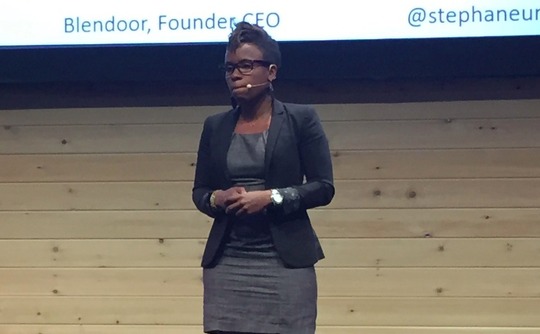
In 2015, African American leaders came to Silicon Valley to demand that tech companies hire more black people after figures showed that a mere 2% of the tech workforce at companies like Google and Yahoo are black. That same year, Intel CEO Brian Krzanich pledged to spend more than $300 million to diversify talent in the tech industry, and invest $125 million in companies run by women and underrepresented minorities. Two years into this heroic diversity push, and the numbers of women and underrepresented minorities in tech have not budged.
In this interview, we talk to Stephanie Lampkin, Founder and CEO of Blendoor, an app that aims to take bias out of the recruiting process. Lampkin graduated from Stanford University with an engineering degree and received an MBA from MIT’s Sloan School of Business. When she started interviewing for a job in tech, she was told by recruiters that she wasn’t “technical enough” and should look for a job in marketing or sales instead. Here, Lampkin discusses why diversity numbers in the tech industry are not moving, and what her company is doing to help solve the problem.
There’s been a big push in Silicon Valley over the past few years to create more diverse workplaces through greater Diversity and Inclusion (D&I) efforts, but the number of women and underrepresented minorities in tech is not budging. Why is this?
Stephanie Lampkin: I only see evidence of it diversity efforts working where there is true buy-in and prioritization from the C-Suite. Without that buy-in, middle management will stifle any real opportunities for improvement if they aren’t properly incentivized. Hiring and rewarding talented people equally important, if not more important, than a company’s investment in new technologies, and it has to be regarded as such. Why? Because there are talented people who can solve these problems who aren’t even able to get in the game, or who get there and aren’t treated well. Change will happen when we invest as much in education, the STEM pipeline and human resource management as we do in R&D.
What is Blendoor doing to move the needle on diversity?
SL: Our big-picture vision at Blendoor is “Inclusive People Analytics.” As we’ve seen with yet another reported case of discrimination on AirBnB, it’s clear we have a problem with how identity (gender, race, age, height, weight, ability, nationality) can limit opportunities for people on various technology platforms. The Internet, which is supposed to be the “great equalizer,” is perpetuating the same social limitations (bias, racism, sexism, xenophobia) that happen in real life. Whether it’s hiring, compensating, finding an AirAnB, getting an Uber, or crowdfunding on Angelist, my goal is to create technology that removes bias that leads to poor decision-making and replace it with technology that helps establish an individual’s credibility, trustworthiness and qualifications in a proven and consistently reliable way. We want to match candidates based on merit, not molds.
How will your new tool, BlendScore, raise transparency about how companies are doing in their diversity efforts?
SL:Tech companies in the U.S. have been publishing their workforce diversity statistics for almost 3 years now, and the numbers are relatively unchanged. Many of these companies are hoping to create change by hiring a chief diversity officer or giving money to nonprofits, but they are notl putting underrepresented people in positions of real power and influence. I believe that behavioral change and prioritization will happen through data, transparency, and accountability. We’re ready to peel back the onion. BlendScore will be for companies what the U.S. News World Report is for colleges & universities or the LEED certification is for buildings, which rates how “green” and sustainable they are. BlendScore rates companies on bias, diversity and inclusion.
What are you doing to help companies recognize unconscious bias?
SL: BlendScore is a public-facing rating of a company’s transparency and effort to drive equity, diversity and inclusion. BBI, on the other hand, is a company’s private “unconscious bias credit score” where they can see where and how bias is interfering with sound business practices and how they measure up against similar companies. BBI offers benchmarks and analytics that help management see the “blindspots” that human bias creates. The BBI score itself does not factor into a company’s BlendScore.
What is your reaction to Susan Fowler’s recent allegations of sexual harassment during her year as a software engineer at Uber?
em>SL:I think it was a bold move and much needed, and I believe there will be more stories like this to come. We are drawing closer to an era where it will be expected that tech companies are transparent and accountable in how they treat people.
How has the fundraising been going?
SL: In the past 12 months, we’ve raised $120,000 from Elevate VC and angel investors, bringing our grand investment total to $155,000. Fundraising has been by far the hardest and least meritocratic process I’ve ever gone through. My advice: if you’re not going anywhere after 6 months and you can afford to, find another way. I am now turning down meetings from top VCs because it’s a waste of our time. We are looking towards crowdfunding, foundations, and social impact focused funds.
